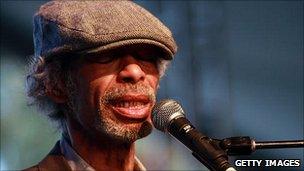Tributes paid to Gil Scott-Heron
- Published
Musicians and friends have been paying tribute to the poet and hip-hop pioneer Gil Scott-Heron, who has died at the age of 62.
Eminem, Talib Kweli and Snoop Dogg were among the rappers who acknowledged his influence after hearing the news.
Public Enemy member Chuck D said on Twitter: "We do what we do and how we do because of you."
Wu-Tang Clan's Ghostface Killah wrote: "Salute Gil Scott-Heron for his wisdom and poetry! May he rest in paradise."
Scott-Heron, often called the Godfather of Rap, died in a New York hospital.

Gil Scott-Heron released his final album, I'm New Here, in 2010
His material spanned soul, jazz, blues and the spoken word. His 1970s work heavily influenced the US hip-hop and rap scenes.
His work had a strong political element, and one of his most famous pieces was The Revolution Will Not Be Televised.
Eminem wrote on Twitter: "RIP Gil Scott-Heron. He influenced all of hip-hop."
Cee Lo Green paid tribute to "the god Gil Scott", while Talib Kweli said he "completely influenced me as an artist".
Politically outspoken rapper Michael Franti said Scott-Heron's talent was his ability to "make us think about the world in a different way".
He would make listeners "laugh hysterically about the ironies of American culture, anger at the hypocrisy of our political system, all to a beat that kept us on the dance floor, with a voice and flow that kept you waiting with anticipation for the next phrase".
Richard Russell, who produced and released Scott-Heron's final album I'm New Here in 2010, described him as "a master lyricist, singer, orator, and keyboard player".
"Gil was not perfect in his own life," Russell wrote, external. "But neither is anyone else. And he judged no-one.
"He had a fierce intelligence, and a way with words which was untouchable; an incredible sense of humour and a gentleness and humanity that was unique to him.
"Gil shunned all the trappings of fame and success. He could have had all those things. But he was greater than that."
The musician's publisher Jamie Byng remembered him, external as "a giant of a man, a truly inspirational figure whom I loved like a father and a brother".
Scott-Heron infected people who encountered him with his "singularity of vision, his charismatic personality, his moral beauty and his willingness to take his fellow travellers through the full range of emotions", Byng wrote.
"Throughout a magnificent musical career, he helped people again and again, with his willingness and ability to articulate deep truths, through his eloquent attacks on injustices and by his enormous compassion for people's pain.
"Hundreds of thousands of people saw Gil perform live over the decades, always with remarkable bands, and few came away untouched by his magnetism, humility, biting wit and warmth of spirit."
Lemn Sissay, a friend of Scott-Heron's who produced a documentary on his work, told the BBC he was "a polymath" who "spoke crucially of the issues of his people".
"In the late 60 and early 70s, black poets were the news-givers, because their stories were not covered in truth in the mainstream media," he said.
- Published28 May 2011
- Published28 May 2011